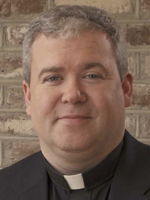People are often curious or shocked when they encounter the Catholic custom of praying for the dead. They ask, “Why do you pray for them? They’re dead!”
The question reflects some strongly held cultural beliefs about death: it is a final end, we’re permanently separated from loved ones, and there’s nothing else beyond death. As Catholics, we assent to none of these convictions.
In our lives, we hold up a vastly different creed. And this creed is grounded and inspired by the resurrection of the Lord Jesus from the dead.
Our central belief, which unites and gives expression to other beliefs, is that all believers—in varying degrees—are one body in Jesus Christ. This body is invigorated by the Holy Spirit, and nothing—not even death—can divide the body.
As members of the body of Christ, we each have certain blessings and graces. We also have particular opportunities and responsibilities as believers. One of these sacred privileges is praying for one another, and this duty does not end at temporal death.
In this life on earth, I frequently ask my fellow believers and friends to pray for me, to make intercession for my needs and situations. Likewise, others ask for my prayers and I show my love and concern by making supplication for them. Within the body of Christ, this causes no barrier or problems with our relationship to Jesus, but actually expands and deepens them.
Death has no power over this prayerful opportunity won by the Lord Jesus’ resurrection from the dead, and the continual activity of the Holy Spirit.
In His public ministry, the Lord Jesus quoted the Old Testament and identified God with Abraham, Isaac, and Jacob. He asserted, “God is not the God of the dead, but of the living” (Mt 22:32). The patriarchs of old live on in eternity, and Jesus points to them as witnesses to us of everlasting life. We seek their help on earth. And, within the body of Christ, we turn to all the saints, the friends of God, who are our older brothers and sisters in heaven. From them, we still ask for guidance, encouragement and prayer.
As believers, we also remember our loved ones and fellow believers who have left this world marked with the sign of faith. We pray that the Lord will be merciful in His judgment, and that their time in purgatory will be purifying.
Purgatory is that transitory passing when the soul is washed in the blood of Jesus after temporal death. The effects of mortal sin and any venial sins on the soul are purged away. As members of the body of Christ, we have powerful prayers which can be offered and assist in this work of the Lord toward the beloved dead.
In Christ, we are all one body. Death comes, and death goes. In Jesus Christ, we are born to eternal life and have everlasting communion with one another in Him. We see this in our prayers, in the way we celebrate the Mass, and in our hope as Christian believers.
Father Kirby is a priest of the Diocese of Charleston, currently in Rome studying moral theology.

